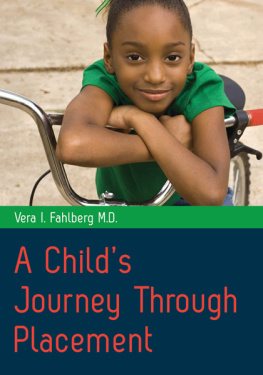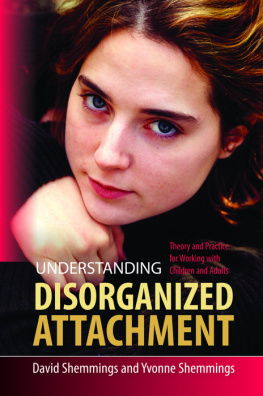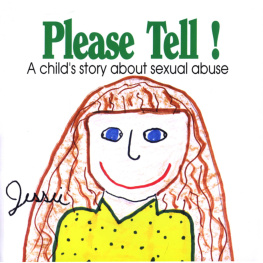The Childs Own Story
Delivering Recovery
Series edited by Patrick Tomlinson, Director of Practice Development, SACCS
This is an essential series on practice for all professionals and parents involved in providing recovery for traumatized children and young people. Each book offers a practical and insightful introduction to an aspect of SACCS unique and integrated approach to children traumatized by sexual, physical and emotional abuse.
of related interest
A Childs Journey to Recovery
Assessment and Planning with Traumatized Children
Patrick Tomlinson and Terry Philpot
ISBN 978 1 84310 330 1
Mental Health Interventions and Services for Vulnerable Children and Young People
Edited by Panos Vostanis
ISBN 978 1 84310 489 6
Therapeutic Approaches in Work with Traumatized Children and Young People
Theory and Practice
Patrick Tomlinson
ISBN 978 1 84310 187 1
Community, Culture and Change 14
Trauma, Attachment and Family Permanence
Fear Can Stop You Loving
Edited by Caroline Archer and Alan Burnell for Family Futures
ISBN 978 1 84310 021 8
Developing Adoption Support and Therapy
New Approaches for Practice
Angie Hart and Barry Luckock
ISBN 978 1 84310 146 7
Creative Therapies with Traumatized Children
Anne Bannister
ISBN 978 1 84310 155 0
Connecting with Kids through Stories
Using Narratives to Facilitate Attachment in Adopted Children
Denise B. Lacher and Todd Nichols
ISBN 978 1 84310 797 2
The Childs Own Story
Life Story Work with Traumatized Children
Richard Rose and Terry Philpot
Foreword by Mary Walsh
Jessica Kingsley Publishers
London and Philadelphia
First published in 2005
by Jessica Kingsley Publishers
73 Collier Street
London N1 9BE, UK
and
400 Market Street, Suite 400
Philadelphia, PA 19106, USA
www.jkp.com
Copyright SACCS 2005
The right of Richard Rose and Terry Philpot to be identified as authors of this work has been asserted by them in accordance with the Copyright, Designs and Patents Act 1988.
All rights reserved. No part of this publication may be reproduced in any material form (including photocopying or storing it in any medium by electronic means and whether or not transiently or incidentally to some other use of this publication) without the written permission of the copyright owner except in accordance with the provisions of the Copyright, Designs and Patents Act 1988 or under the terms of a licence issued by the Copyright Licensing Agency Ltd, Saffron House, 610 Kirby Street, London EC1N 8TS. Applications for the copyright owners written permission to reproduce any part of this publication should be addressed to the publisher.
Warning: The doing of an unauthorised act in relation to a copyright work may result in both a civil claim for damages and criminal prosecution.
Library of Congress Cataloging in Publication Data
A CIP catalog record for this book is available from the Library of Congress
British Library Cataloguing in Publication Data
A CIP catalogue record for this book is available from the British Library
ISBN 978 1 84310 287 8
eISBN 978 1 84642 056 6
For my parents for providing me with a positive childhood these children were denied; for my wife Paula and our boys, Ben and Callum, and the unconditional love we share.
Richard Rose
To Eddie and Jill, with love.
Terry Philpot
Every person has a story; the secret is to find it.
Anon.
The Child is Father of the Man.
William Wordsworth
Contents
Foreword
At SACCS we believe that children traumatized because of abuse have suffered harm to their person, their body, their innocence, their childhood, their emotional health, their spiritual wellbeing, and the right to grow up in their own family. Most importantly they are children; normal children to whom abnormal things have happened, ordinary children who have had extraordinary experiences. Because the harm they have suffered is often so profound, affecting both their external and internal worlds, we have developed an approach that seeks to reach the very essence of these children and focuses on their recovery.
Since 1987 we have been developing services to meet the needs of this very vulnerable group of children, most of whom are emotionally fragmented. We recognize the need to help the whole child recover, both in residential care and in family placement. There are three integrated strands to this important work: therapeutic parenting, therapy and life story work. This book is concerned with life story work but makes reference to the other two aspects of our approach because of the integrated nature of the work, to which I have referred.
As readers of this book will discover, through intensive research into the childs past, life story work enables the child to understand what has happened, when and where they have lived, who has cared for them, and, most important, the decisions that have impacted on their lives.
Because most of the children who come to us have experienced many placement breakdowns their histories are virtually lost. Children need to understand their history if they are to move on in their lives, and if we do not collect this information there is every chance that it will be lost for ever.
The life story worker carefully picks up the scattered shards of a childs life, putting them together with great sensitivity. A long process begins to help children internalize understandings and to explore the meaning of their life and identity. Without the opportunity to integrate this work into the rest of the therapeutic task, the chances of children being able to make sense of what has happened to them and put the past into place are very slim.
Richard Rose and Terry Philpot have written a comprehensive description of the approach to life story developed within SACCS, which they set in the context of what we know about childrens development, attachment, identity, the effects of abuse and other matters.
We believe that life story is an approach that deserves wider application, so that it can be practised by workers wherever they are employed, be that in local authorities, the private or the voluntary sector. This book will be a resource not just for social workers but for others, like foster carers and teachers, who have responsibility for children.
The journey to recovery is a long one and it belongs to the child. The child is at the centre of everything we do a principle exemplified by life story work.
Mary Walsh Founder and Chief Executive of SACCS
Preface
First, a word about SACCS (see also The Story of SACCS on p.151), which has pioneered life story work as featured here. SACCS came into being in 1987 and since that time it has worked with hundreds of children offering therapy, residential care and an independent family placement fostering service. In 1997 SACCS appointed one of the authors of this book, Richard Rose, as life story worker. He looked at conventional life story work and found it inadequate for the work that SACCS wished to do with the children in its care. At the time of writing, SACCS is working with about 60 traumatized children, all of whom are engaged in life story work.






